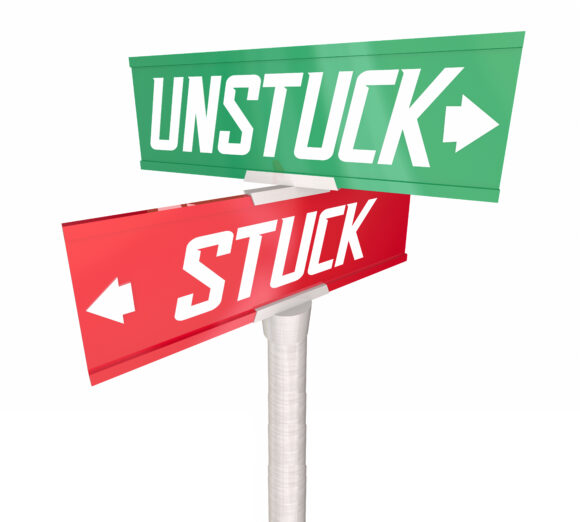Every business hits one or more plateaus during its development. This is normal, natural, and predictable.
What once worked no longer works — at least as well as it used to work. I call this getting “stuck” because like a car bogged down in mud with its wheels spinning, the business is no longer making progress. Like the driver of the car, the business owner needs to do something differently to get out of the rut and get moving forward again.
The reasons a business gets stuck and stops growing the way it once did can be infinite. Usually though, they fall into a few basic categories. And while solutions to getting unstuck can also be unlimited, there are a few consistent strategies that tend to lead to regained momentum for the anxious entrepreneur.
Strategy. When a new agency is formed, the owner generally has a simple growth strategy. This is a good thing because the nature of a new business is that results are often difficult to predict. This uncertainty and the need for frequent pivots tend to create a reactionary management style. So, though the founder may have started with a business plan, that business plan is often abandoned before too long.
The strategic reason for stalled growth is this: Simply doing more of what you are already doing is inefficient, often unprofitable, and unpredictable. The way to get on the path to high growth again is to be intentional.
I think an excellent strategic plan can be easily, effectively and quickly developed by exploring five areas:
- What do I want to do? What you want is related to what you can be excited and passionate about. That, in turn, drives the intensity of effort required to get great results. Being clear and committing to your own personal reasons for building the business is key to developing a great strategy for making it happen.
- What is your business good at? Build a strategy to maximize this.
- Conversely, what do you not do well? Can you improve your weakness or would it be better to abandon efforts in this area?
- Who is underserved in your market? Is there a way to do something better than your competitors? Do you have unique strengths in your carrier mix? Is something happening in your local economy you can pivot to for growth?
- What must you guard against at all costs? What stands in your way?
A strategic plan is simply one that answers questions like those listed above. The answers will be unique to you. By the way, these questions are foundational to a simple thinking exercise called a SWOT (Strengths, Weaknesses, Opportunities and Threats) analysis.
Systems. Most businesses start with rudimentary systems for running operations. As the business grows, those systems must stretch. Unfortunately, the amount of stretching a business can do is typically inadequate for its new size and complexity. These systems — accounting and finance, marketing, sales, hiring and human resources, and record keeping — can thwart continued growth.
Business owners whose progress has slowed or stalled can usually point to the systems they lack or that are not working well. Getting unstuck and starting new is not difficult. Start with these questions:
- Is my accounting system, and the people who operate it, giving me accurate, timely and useful information? Do I understand where money comes from, where it goes and how much I need at all times? Can I immediately see how we are performing to budget and how we compare with industry norms? Does my system efficiently integrate with my operating systems?
- Do I have easy-to-use customer management systems that operate as a byproduct of quoting and selling insurance? Am I easily able to see and analyze the data in those systems to sell more products to my current customers, regain old customers, find new customers and maximize our selling strategies?
- Am I able to easily and effectively manage my employees’ payroll, benefits, hiring and other processes?
- Do I have a documented flow, followed by all employees for how we market, prospect, sell, service, manage claims and other product-related operations?
- What are we doing in the business that isn’t standardized, efficient, documented and followed by all?
To get unstuck, look at the questions where you find your answers unacceptable, rate them by importance and develop a schedule and budget for fixing them. In just a few months, you should see more efficiency, greater productivity and lowered per-unit expenses from better systems and processes.
Staffing. Sloppy hiring is a frequent killer of momentum because the harried entrepreneur needs help now and may not know how to hire well or may not be methodical enough to staff up before the crisis comes. Ensure you have enough of the right people by asking yourself these questions:
- Am I using industry benchmarking studies to ensure we are hiring in advance of our needs?
- Do I have a competitive, comprehensive compensation package?
- Do I have an intentional, values based, culture that makes us an attractive employer?
- Do I have measurable performance standards, and do we manage to them, for all employees?
- Is my agency proactive in dealing with problem employees or do we let problems solve themselves?
Sales over Service. I remember when, as a first-year producer and new agency owner, my partner told me to enjoy my sales success because it would become increasingly hard to sustain as I spent more time servicing. That is traditionally what happens in the agency business and is an absolute killer of continual growth.
To get your agency unstuck, and growing again, ask:
- Is my agency a “sales” or a “service” organization? Yes, service, and great service at that, is critical. But if it’s the most important thing, you’ll stay stuck.
- Does my agency compensate every employee for new business growth? Are new sales expected from every customer facing employee?
- Does my agency compensate more for new than renewal business?
- Does my agency compensate higher for higher-margin, more rounded, more profitable business or do we have a one-size-fits-all commission program?
- Does the agency have an effective service hand-off program so sales people aren’t bogged down with servicing tasks and can focus on revenue creation?
- Is the agency managing our books of business to focus on selling accounts and products where we make the best compensation? Or do we just sell products from the representative who shows up with the easiest or cheapest carrier?
There are lots of other questions you could ask yourself here. The point is that if revenue growth is flagging, you must find out why and fix it. Otherwise, you will remain stuck.
As a business grows, it naturally gets more complex, and of course larger. What once worked no longer does, or at least, not as well. To maintain or regain momentum change is required. The good news is that forward progress will be restored, and new growth will happen as you grapple with the answers to these and similar questions. And then your larger, more successful, agency can repeat the process again as you seek to conquer the next plateau.
Topics Trends
Was this article valuable?
Here are more articles you may enjoy.



 Kemper Exits Preferred Home and Auto Business Immediately
Kemper Exits Preferred Home and Auto Business Immediately  Heritage Insurance Reports Third Straight Quarter of Profit After Shedding Policies
Heritage Insurance Reports Third Straight Quarter of Profit After Shedding Policies  Inflation, Catastrophe Losses Lead P&C Underwriting Loss in 2023
Inflation, Catastrophe Losses Lead P&C Underwriting Loss in 2023  Security First Accountant Charged with Siphoning $1.4M Through Fake Invoices
Security First Accountant Charged with Siphoning $1.4M Through Fake Invoices 


